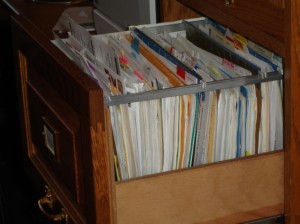 With an estimated 100 billion brain cells, are our brains like a giant filing cabinet?
With an estimated 100 billion brain cells, are our brains like a giant filing cabinet?
If so, what are the similarities between how we file information in our brains vs. in a file drawer or on our computers?
As researchers study the different causes of dementia, we are learning more about how our brains work.
Johns Hopkins posted a health alert recently about how we make memories.
Memories are formed in three stages:
- Acquisition
- Consolidation
- Retrieval
As I read the article, I visualized how I use a file cabinet or the computer.
ACQUISITION
With today’s onslaught of information, I glide through the busy patches of life by placing information on my computer’s desktop – yes, the home screen on my computer. You may do the same on your tablet or smartphone. And who doesn’t toss hard copies of information in a pile? When that pile grows too tall or our screens grow too cluttered, what do we do? We create a catchall file or box in which we place information we’ll refer to later.
In effect, we postpone learning and digesting the information we set aside. Since we’re aware of it for a moment, this awareness resides in our short-term memory, which is fleeting.
CONSOLIDATION
It isn’t until we file the information that we begin the process of consolidation.
Evaluating where to store it–which file is most appropriate for this information–helps us strengthen the neural pathways to our memories.
If the information is of interest now–it relates to a project we’re working on–we’ll likely add it to our layers of knowledge; thus, forging more connections in our brains.
To forge these connections, which impacts retrieval, we’re smart to add new labels to file drawers or to create easily accessible shortcut links on our computers. These actions will strengthen our recall.
RETRIEVAL
The stronger these connections grow, the more quickly and easily we’re able to retrieve information. This is why we remember peoples’ names with whom we interact regularly and forget those we meet once.
Information is worthwhile if we can retrieve it when we need it.
For millions of people living with cognitive impairing diseases like Alzheimer’s, vascular, and other causes of dementia, this becomes an excruciating and frustrating issue.
For the rest of us, the Johns Hopkins article admonishes:
…if you have a problem remembering something,
maybe you weren’t concentrating on it too hard in the first place.
Retrieving information grows easier the more often we use it. The same holds true if we’ve filed an interesting or other significant piece of information. The key is how we file the information and this depends on what’s important to us now. Our filing categories change based on what we’re focused on at a given time in our lives.
We first need to decide whether a piece of information is important enough to retrieve. And if it is, then we must file it appropriately in order to retrieve it when we need it.
For related articles, visit Memory. [3/20/2024 TCV Update: URL no longer connects.]









Great article and is exactly how I picture our brain.